|
Robert
Mason
Mills
1819-1904
|
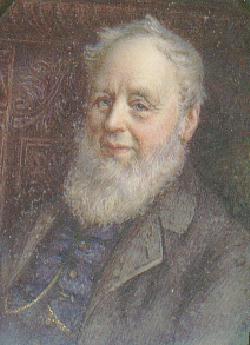
|
One of the most important industries to be developed in Bourne during the 19th century that became known throughout the world was the extraction and distribution of pure water from its underground springs and the man responsible for this endeavour was R M Mills.
Robert Mason Mills was born at Hackney in Middlesex on 2nd April 1819, the son of a solicitor, but decided on a career in pharmacy rather than law, and when his father died while he was still in his teens, he became apprenticed to an apothecary at Shoreham in Sussex. Anxious to improve his prospects, he moved to Bourne in 1842 to take over the management of a chemist's shop at No
1 West Street that was owned by Mr Frank Daniel who had founded the business in 1815, the year of the Battle of Waterloo. Mr Daniel had been in failing health and when he died three years later, his widow
sold out to the new manager. In the same year, Robert married Miss Fanny Hodgkin,
aged 22, daughter of Mr Henry Hodgkin, a prominent agriculturalist from Edenham, and they moved in to live in the rooms above the shop.
|
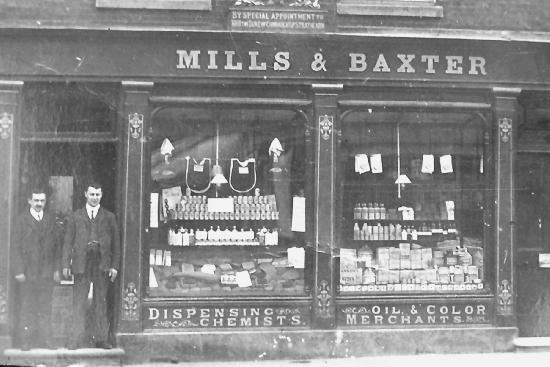 |
|
The chemist's shop at No 1 West Street
where Robert Mason Mills worked and lived from 1842 until he died in
1904. This photograph was
taken around 1910 and the two men in the doorway are most
probably shop assistants or trainee pharmacists who lived on the
premises.
See also The snow storm of
1916. |
The business prospered under his ownership and soon he combined it with that of seed merchant but the real success began in 1864 when he began to manufacture aerated water under the
name of Mills and Co., the Original Bourne Waters, a project that was to bring a new prosperity to himself and to the town. By 1878, the water had achieved a nationwide reputation and in that year, he brought in Thomas Moore Baxter, a young chemist from Wisbech but who had been working in Brighton and had struck up a romantic attachment with his
22-year-old daughter Emily. Mr Mills decided to concentrate on the water side of the business while Baxter ran the shop and
subsequently married Emily.
The manufacture and supply of aerated water was the first venture of its kind in this part of South Lincolnshire and his products were soon acclaimed world wide. During the Egyptian campaign of 1882 for instance, a large quantity of his mineral waters was sent out for British soldiers and the firm was later awarded a Royal Warrant for supplying
Queen Victoria's son, the Duke of Connaught. Supplies of soda water and ginger
beer were sent in wooden cases by rail to hotels and country houses where the
drinking water from wells was not always of a good quality. There was also a
brisk trade in the hunting shires of Lincolnshire, Rutland and Leicestershire,
where wealthy members of the Belvoir, Quorn and Cottesmore Hunts had their
hunting boxes during the winter months.
Soft drinks also became popular during the summer with passengers taking train
trips to the seaside and supplies were sent to various railway station waiting
rooms around the country. The business grew so rapidly that it was soon employing 24 men and for almost half a century, the company had a distribution area extending from Doncaster in the north to Hatfield in the south as well as many intermediate stations.
|
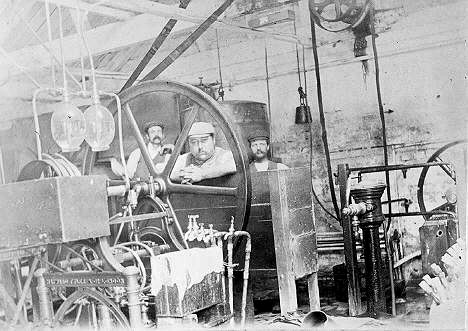 |
The mineral works
and bottling plant at the rear of the premises in West Street, now
used as a car park by local office workers. |
Robert Mason Mills had many interests apart from his business. He was a prominent member of several archaeological societies and was an authority on local architecture. He was also a man of great artistic talent and collector of antiques and when he died, left a large collection of paintings and prints together with furniture, china and books.
In 1860, he presided at a public meeting held for the purpose of considering the
erection of a public hall for the town and the result was the building of the Corn Exchange in 1870 at a cost of £2,000. He was also chairman of the town's water and gas companies, both undertakings that were subsequently purchased by Bourne Urban District Council. He was also the first of three generations who acted as local agents to the successive Marquesses of Exeter who were Lords of the Manor of Bourne.
He also became a firm friend of Charles Worth, son of a Bourne solicitor who went to Paris in 1845 and established his internationally famous fashion house where he founded
haute couture. He frequently visited him and his family at their palatial villa at Suresnes and both
Worth and his two sons visited Bourne for a glimpse of their father's home town.
A dedicated churchman, he was also a benefactor of the Abbey Church at Bourne and in 1883, the west end was restored practically at his expense, in memory of his wife Fanny who had died two years earlier on 10th September 1881 at the age of 58, and his generosity is marked by a plaque saying: "To record the restoration of the west end of this church by Robert Mason Mills of Bourne, this brass plate is placed by the congregation: 1883." Then four years later, he paid for three new stained glass windows to be installed in the south wall to commemorate Queen Victoria's Golden Jubilee. The centre window bears in each corner the inscription Victoria Jubilee with the date 1887 in the middle. He also completed the restoration of the nave in 1893, the chancel in 1903 together with the porch and south roof.
He was, in fact, an ardent royalist, and was particularly proud at having been born in 1819, the same year as Queen Victoria and whom he had seen in London when he was a child. He wrote personally to the Queen on the occasion of her Diamond Jubilee saying:
|
May it please
your Most Gracious Majesty to allow me as one of your humble and
devoted subjects to congratulate you on your 78th birthday and
also upon your reign of 60 years and may you continue to reign. I
was born on 2nd April 1819. I had the honour of seeing your
Majesty with the Duchess of Kent at the age of 8 years at
Vauxhall, also at your Coronation and the Opening of Parliament
and other State occasions. I feel I have been a devoted subject
during your Majesty's glorious reign over a happy and contented
people. May your Majesty continue in good health and strength to
reign over your subjects for many years. I remain with the
profoundest veneration, your Majesty's most faithful subject and
devoted servant. - Robert Mason Mills, Bourne, Lincolnshire, 12th
June 1897. |
The letter prompted a response from the Privy Purse Office six days later saying: "The Private Secretary is commanded by The Queen to thank Robert Mason Mills for his letter of good wishes. - 18th June 1897, Buckingham Palace."
Mr Mills died on 17th March 1904, aged 85, and the funeral was held at the Abbey Church when the vicar, the Rev H M Mansfield, officiated assisted by the curate, the Rev R B Payne. One of the local newspapers reported: "It was held amidst many expressions of sorrow and tokens of sincere regret. The funeral was, in accordance with the wishes of the family, of a quiet character but it was nonetheless impressive. Parishioners attended in large numbers and the church was filled to overflowing. The cortege went from the deceased's late residence to the fine old church in which he had taken such a deep and practical interest. There, the first part of the services was performed with a full surpliced choir. The first portion of the service was impressively read in the church and the hymn Now the labourer's task is o'er was effectively rendered by the choir. En route from the church to the cemetery, the mourning party were preceded in procession by the vicar and curate and the choir. Upon arrival at the cemetery, the choir sang the Nunc Dimittis. The service concluded with the singing of the hymn On the resurrection
morn. The coffin was of polished oak with a brass cross and fittings and bore the simple inscription recording the date of birth and death. Although there was a request that there be no flowers, several beautiful floral tributes were sent and at night, a half-muffled peal was rung on the church bells."
|
He was buried in
the town cemetery with his wife Fanny who had died on 10th
September 1881 at the age of 58 and a single stone obelisk on two
plinths marks their grave.
After his death, the contents of his home in West Street were sold at a two-day auction at the Corn Exchange on 17th-18th May 1904 and included antique and modern furniture from two reception rooms, library and five bedrooms. Also sold were his art collection of 140 oil paintings and engravings, the highest price paid being ten guineas (worth £626 at today's values) for The Red Hall, Bourne by an artist named A C Glendening.
|
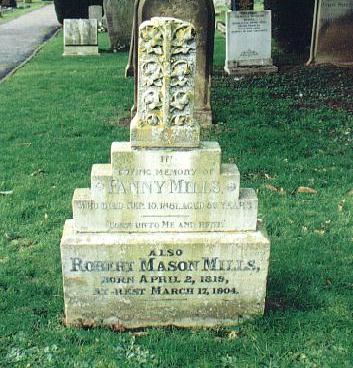 |
The other lots included various antiques, silver and Sheffield plate, porcelain such as Wedgwood, Worcester, Crown Derby and other wares, clocks and bronzes, and 60 dozen bottles of vintage port wines. The sale fetched a total of almost £900 that would be worth over £56,000 today.
His will, also published that month, showed that he had left estate valued at £15,080
gross (equivalent to £933,000 today), and that probate was granted to his daughter Mrs Emily Baxter and her husband Thomas. He left Emily his household effects and an immediate legacy of £100. There were other various bequests including a legacy of £50 to
Lizzie Sprigden, the servant who cared for him during his final years, together with an annuity of £30 and the use of a house for life. He also left £20 to a clerk in his employ and one week's wages each to farm
labourers and others in his employ while the residue of the estate was left in trust to his daughter for life.
On the death of R M Mills, the aerated water business was taken over by his son in law Thomas and continued to flourish.
|
No 1 West Street |
|
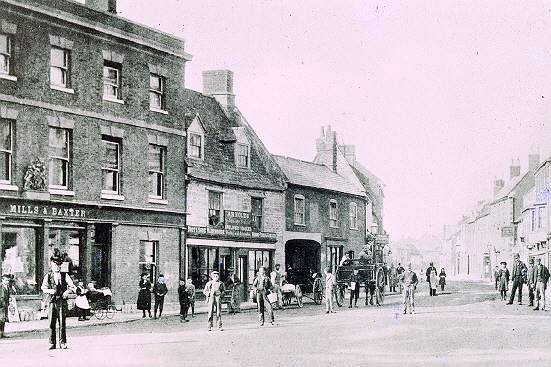
This
is West Street in the late 19th century when Bourne would have
been
an
extremely quiet and peaceful place to live. |
|
Robert
Mason Mills chose to live at No 1 West Street from the time he
took over the business in 1845 until he died in 1904. In the light
of today's circumstances, it may seem a strange choice for a rich
man to continue living above the shop in the town centre but
Bourne was an extremely quiet place in the 19th century and the
only traffic was horse-drawn. Furthermore, the outside appearance
of the building is deceptive because accommodation on the two
upper floors is extensive and in those days included two spacious
reception rooms, a library and five bedrooms as well as the other
amenities such as bathroom, toilet, and extremely large cupboards
and pantries in the kitchen area on the ground floor behind the
shop.
It
was also sufficiently adequate to house Mr Mills' extensive
collection of books and almost 150 prints and paintings as well as
other antiques. The apartment therefore was bigger than most of
today's modern houses and large enough to accommodate nine people
as can be seen from the national census of 1851 when the occupants
living there were recorded as:
Robert Mason Mills, aged 31
Fanny Mills, aged 25
Fanny Mary, aged 4
Catherine Hodgkin, visitor from Edenham (Fanny's mother)
Ann Astin, nurse
A Laurence, apprentice chemist
G Wadsley, apprentice chemist
Mary Frith, servant
Emma Kettle, servant
Note: Fanny Mary Mills died 4th April 1851 aged 4 years 8 months
Emily
Amelia Mills died 30th November 1850 aged 9 months
Emily Fanny was born in 1855 after the census was taken.
NOTE: I am indebted to Rex Eckford of Property
Services for his kind permission to view
the upstairs apartments at No 1 West Street.
|
See also
The sale of the century
A case of contaminated water
The
aerated water industry
Church restoration in the 19th century
Thomas
Moore Baxter
Mrs Pat Edmunds
Bourne
in 1871 A C Glendening

Go to:
Main Index Villages
Index
|



